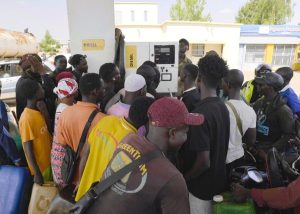BAMAKO, Mali (AP) — The landlocked West African nation of Mali is being squeezed by a blockade on fuel imports imposed by jihadi militants, an unusual strategy as the insurgent threat grows across the region.
Education Minister Amadou Sy Savane announced late Sunday that schools nationwide will be shut for two weeks because the scarcity of fuel makes it difficult for staff to get to work, as is the case with most other workers.
For a country that relies on fuel imports from neighboring Senegal and Ivory Coast, the blockade has been a major setback for Mali’s military junta.
Militants imposed the blockade to fight back against the military
Mali, a country of 25 million people, has battled jihadi militants for several decades, alongside neighboring Burkina Faso and Niger.
Militants from the al-Qaida-backed Jama’at Nusrat al-Islam wal-Muslimin group announced a ban on fuel imports from neighboring countries into Mali in early September, after authorities said early this year they were cutting down fuel supplies to remote areas as a measure to squeeze the jihadis in their hideouts.
The blockade has squeezed Mali’s fragile economy and left hundreds of fuel trucks stranded at the border.
Militants show strength
JNIM is the most potent armed group in the Sahe l, a vast strip of semi-arid desert stretching from North Africa to West Africa. Observers say the militants are using the fuel blockade as a show of force despite Malian military strikes against them.
The militants have targeted transport companies along major roads, forcing some of them to stop fuel operations.
According to Beverly Ochieng, an analyst at the Control Risks Group consulting firm, the blockade is used as a tool to pressure commercial operators and residents to distance themselves from the military authorities, therefore undermining the legitimacy and authority of Mali’s military government.
Mali’s junta has struggled to end the security crisis that brought it to power
Military leaders in Mali staged a coup in 2020, saying it was necessary to end decades of security crises.
Following similar coups in Niger and Burkina Faso, the three neighbors expelled French forces and turned to Russia’s mercenary units to help them fight jihadis. However, despite Russia’s support and a security partnership between the three nations, analysts and conflict data suggest the crisis has worsened.
Some of the attacks in Mali this year have been the deadliest in more than three years, according to an assessment by the U.S.-based Armed Conflict Location & Event Data Project, pointing to trends of attacks that often targeted security forces.
JNIM, in particular, is deliberately trying to destabilize the governments in the three Sahel countries, the group said in a report.
The blockade is worsening hardship
Despite being one of Africa’s top gold producers, Mali is ranked the sixth least developed nation in the world, with nearly half its population living below the national poverty line.
The fuel blockade has hiked commodity prices, worsening living condition for millions.
In Mali’s capital, Bamako, endless queues have stretched in front of gas stations with some residents spending nights waiting.
Mali’s military has attempted to escort fuel trucks from border areas to Bamako while also targeting JNIM locations with airstrikes. Some trucks have made it to the capital but others have been attacked by militants.
The military is hampered by the lack of air power, said Oluwole Ojewale with the Institute for Security Studies.

